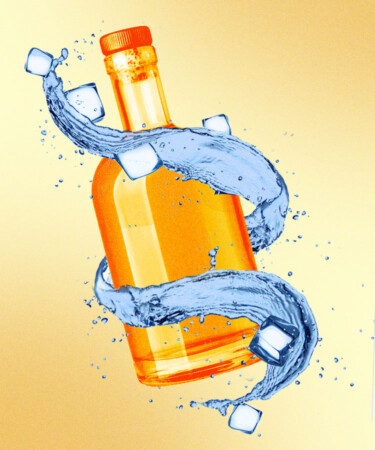True whiskey connoisseurs know that adding a few drops of water is key to unlocking the spirit’s complex aromas and flavors. Though it may seem counterintuitive, studies have proven that slightly diluting the liquid indeed enhances its flavor — but one lingering question remains: What type of water should be used? To find out more about this subject, VinePair spoke with Nick Farrell, spirits director and owner of Show of Hands, a whiskey bar in Washington, D.C.
Farrell explains that there are a few different types of water that are favorable for diluting whiskey. The key to determining which is most suitable lies in its mineral content. Salt and ions such as calcium and potassium found in most tap water can largely influence the taste of alcohol, so it’s best to opt for water that has been treated, such as the ones below.
Limestone-filtered Water
Traditionally used to produce bourbon in Kentucky, limestone-filtered water has become a popular choice for diluting neat whiskies. As the water flows over limestone rocks, minerals such as iron are filtered out, increasing the water’s pH. When added to a spirit, Farrell explains, the alkaline water influences qualities such as mouthfeel and viscosity.
“A higher pH water, such as the limestone-rich types, softens the whiskey on the palate and alters the way it feels,” Farrell says. This, along with the intensification of particular aromas and flavors, can provide a superior drinking experience.
Unlike the other options on this list, limestone-filtered water is one specifically crafted to be added to bourbon. If you fancy yourself an aficionado, you may be familiar with the most famous brand, Old Limestone Mixing Water, which dubs itself “the official companion of Kentucky bourbon” and promises to give bourbon a velvety smooth texture with just a few drops.
Distilled Water
More commonly used and easily accessible than limestone-filtered options is commercially distilled water. “Unlike tap water, distilled water is highly filtered and completely neutral,” Farrell says.
With no minerals or additives, distilled water is ideal for adding to whiskey because it enhances whiskey without introducing any new flavors. “When used to dilute whiskey, distilled water simply allows the flavor compounds to debond from the ethanol without distorting its taste,” Farrell says.
Sold at most grocery and convenience stores, distilled water is by far the easiest treated water to find. Farrell notes that it also has the fewest impurities of any water and therefore benefits a range of whiskies including rye, bourbon, and Scotch.
Deionized Water
Often mistaken for distilled water, deionized water is treated to remove both ions and mineral salts. This means deionized water has a completely neutral pH and is neither hard nor soft. Although the resulting taste is similar to that of distilled water when added to whiskey, deionized water is not as accessible, making it a less popular choice.
Farrell explains that while all three types of water are optimal for diluting whiskey, the best option depends mostly on personal preference. “Everyone has different preferred tastes,” he says, “so it’s best to choose a water that fits your profile.”
